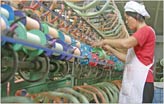Politics
Source: US drone base set for Persian Gulf region
Updated: 2011-06-15 11:29
(Agencies)
WASHINGTON - The United States is building a secret CIA air base in the Persian Gulf region to target terrorists in Yemen, preparing for the possibility that an anti-American faction may take over Yemen and ban US forces from hunting a lethal al-Qaida faction there, The Associated Press has learned.
The anti-al-Qaida effort in Yemen is being run by the Joint Special Operations Command, the top US military counterterror outfit, and the CIA provides intelligence support. Joint command forces have been allowed by the Yemeni government to conduct limited strikes there since 2009 and recently have allowed expanded strikes by US armed drones and even warplanes against al-Qaida targets trying to take advantage of civil unrest to grab power and territory in the mountainous country at the tip of the Arabian Peninsula.
The new CIA base will provide a backstop, if al-Qaida or other anti-American rebel forces gain control, one senior US official explained. The White House already has increased the numbers of CIA officers in Yemen, in anticipation of that possibility. It has stepped up the schedule to construct the base, from a two-year timetable to a rushed eight months.
The Associated Press has withheld the location at the request of US officials. They spoke on condition of anonymity because portions of the military and CIA missions in Yemen are classified.
Drones like Reapers and Predators are unmanned aircraft that can be flown from remote locations and hover over a target before firing a missile. Yemeni officials have indicated their preference toward drones, versus allowing US counterterror strike teams on Yemeni soil, saying they are less apt to incense the local population.
The planned CIA base suggests a long-term US commitment to fighting al-Qaida in the region, similar to the model used in Pakistan, where CIA drones hunt militants with tacit, though not public, Pakistani government approval. Its construction also indicates a possible shift in the internal debate in the administration over whether US special operations forces should continue to lead the fight in Yemen, US officials said.
While that policy debate plays out in Washington, US special operations forces based just outside Yemen are taking aim almost daily at a greater array of targets that have been flushed into view by the unrest. US forces have stepped up their targeting as well, because of the besieged Yemeni government's new willingness to allow US forces to use all tools available against al-Qaida, including armed drones and warplanes, as a way to stay in power, the US officials said.
The CIA would not confirm the White House decision to build the CIA base or expand the agency's operations in Yemen.
CIA Director Leon Panetta said last week that agency officers were working in Yemen together with JSOC, as well as other areas where al-Qaida is active.
The United States needs to keep the pressure on to break al-Qaida's momentum there, the State Department's counterterror coordinator, Daniel Benjamin, said Tuesday. Yemen-based al-Qaida in the Arabian Peninsula, which US officials consider the most immediate terror threat to America, already is operating more in the open and has been able to acquire and hold more territory, he said.
Benjamin added said there are growing concerns that AQAP will use the chaos to acquire more weapons, and also to fuel connections between al-Qaida-linked militants there and al-Shabab insurgents in Somalia.
The Obama administration has been working for months in concert with the mediation efforts of Yemen's Gulf neighbors to persuade President Ali Abdullah Saleh to transfer power. Since Saleh left for medical treatment in Saudi Arabia, the US has continued to press for a deal in the hope that a political solution could pre-empt any plan by the Yemeni leader of 33 years to return. That, officials fear, could lead to further instability.
Benjamin said he is hopeful that counterterrorism efforts will continue in Yemen, as the, the Yemeni government now hopes US targeting will remove some of the enemies threatening the Saleh regime. That new target-at-will attitude was reinforced after the attempt on Saleh's life when explosive devices were placed in the palace mosque more than a week ago, both US and Yemeni officials say.
The US forces also are taking advantage of the fact that more al-Qaida operatives are exposing themselves as they move from their hideouts across the country to command troops challenging the Saleh government.
The chaos also has led to arrests of al-Qaida operatives by Yemeni forces, and those operatives are talking under joint US-Yemeni interrogation, providing vital information on al-Qaida operations and locations, US officials said.
That intelligence led to the best opportunity in more than a year to hit US-born radical cleric Anwar al-Awlaki in early May. But a host of technical difficulties meant three sep as a haven from which to launch attacks against the United States, while AQAP leaders argued that they should overthrow the Yemeni government. A record of that debate between bin Laden and Yemeni al-Qaida leaders was found among the records at the compound in Pakistan where bin Laden was killed by US forces May 2.
Specials

When two are one
After a separation of 360 years, Huang Gongwang's famous Dwelling in the Fuchun Mountains has been made whole again.

Wealth of difference
Rich coastal areas offer contrasting ways of dealing with country's development

Seal of approval
The dying tradition of seal engraving has now become a UNIVERSITY major